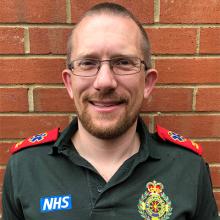Why is this research needed?
Around two-thirds of stroke patients in England are brought to the hospital by emergency ambulance. This means that paramedics are usually the first healthcare professionals to see a stroke patient, and they have a vital role in quickly getting people the urgent medical attention that can reduce damage to the brain caused by stroke.
The amount of time paramedics in the UK spend with a stroke patient before they are taken to a hospital, called ‘on-scene time’, is longer than in other countries. We don’t know why this is the case and we need to find out how we can reduce this time.
Once suspected stroke patients are on their way, paramedics notify the hospital to expect their arrival. But two-way audio-visual technologies are a promising new way to use this crucial time more effectively. They would allow specialist stroke doctors based in a hospital to speak to paramedics and possibly assess patients while they’re in the ambulance, which could help speed up the treatment that stroke patients receive. However, we don’t know if this type of technology would work in an emergency situation.
What are the aims of this research?
Dr Graham McClelland hopes this research will:
- Improve emergency response times for suspected stroke patients in the UK.
- Improve communication between emergency services and stroke specialists in hospitals.
This first part of the journey for stroke patients is crucial as it can ensure they get the right emergency treatment for their stroke as quickly as possible. This can reduce damage to their brain and give them the best chance of rebuilding their life after stroke.
How will this research be done?
First, Graham will draw together what we already know about ambulance service response for stroke patients in the UK, including working with health care professionals and people affected by stroke.
It will then help to understand and test what can be done to reduce on-scene time and how new technologies could be used in day-to-day emergency stroke care.
What difference could this research make?
During a stroke, nearly two million brain cells die every minute. Emergency treatments must be given within a short time window to stop more cells dying. The faster ambulance services can get stroke patients to hospital for specialist medical attention, the better their chance of rebuilding their life after stroke.
This research could lead to new guidance for healthcare professionals on how to reduce on-scene time and on how new technology could be used day-to-day in ambulance stroke care. This could help to improve care for suspected stroke patients in the crucial minutes and hours after their stroke.
Graham says, "Ambulance services have many demands on their limited time and resources, and right now other conditions receive more attention than stroke. This funding will enable me to continue raising the profile of stroke within ambulance services, and improve care for stroke patients at this important point in time."
Meet the researcher

Dr Graham McClelland is the first research paramedic funded by the Stroke Association and one of very few in the UK. From 2015 to 2018, we funded Graham's PhD. In this next stage of his research career, he will further use research skills, and research and clinical networks to improve care in the crucial minutes and hours after a stroke that, with the right treatment, can reduce death and disability caused by stroke.
